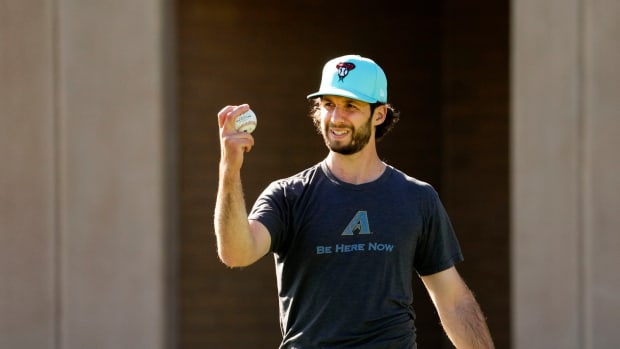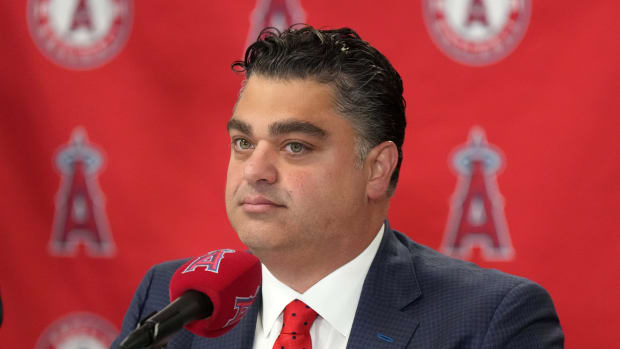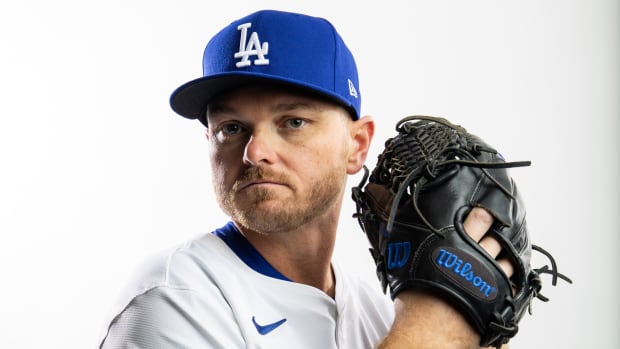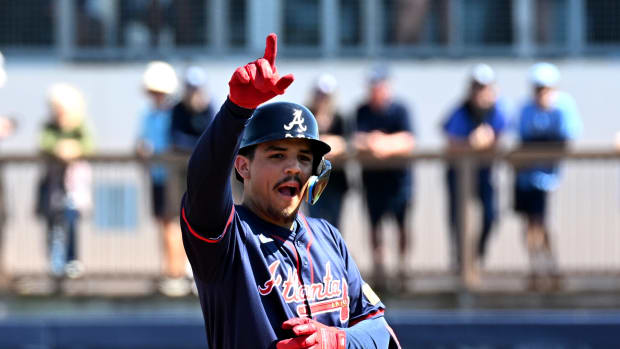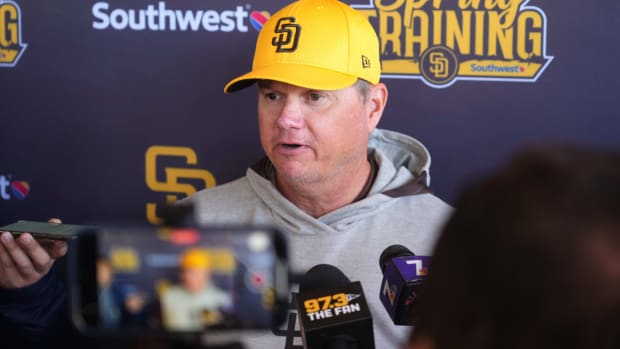Baseball or Football? There's No Easy Choice for Two-Sport Star Kyler Murray
Baseball or football? That’s the choice in front of Kyler Murray, would-be Athletics outfielder and Oklahoma quarterback, now that the two-sport star has declared for the NFL draft—but will he keep his name in it? While Murray's decision doesn't lock him into an NFL future (though it does mean a whole new exhausting round of takes with regards to his viability as an NFL quarterback or first-round pick), the likelihood of him choosing football full-time is strong enough that, on Sunday, the A’s and MLB both sent representatives to try to talk him into sticking with baseball. The likeliest solution is Oakland—which gave Murray a $4.66 million signing bonus after taking him with the ninth pick of last year’s draft—offering him a new major league contract that would pay him more guaranteed money and give him a 40-man roster spot.
That MLB is apparently willing to approve a move that is in (some) violation of its own draft rules is a sign of how desperately it wants to keep Murray in the fold, and of how much leverage he has after a Heisman Trophy-winning season that has NFL teams salivating over him. For the A’s, keeping Murray is as much about the player as it is about not throwing away a top-10 pick, as they’d get no draft compensation if he leaves for the NFL. MLB’s marketing folks, meanwhile, are probably dreaming of Murray becoming a household name as this generation’s Bo Jackson or Deion Sanders—a comparison Murray has already happily indulged. His path, though, would be more like those of Jeff Samardzija, Drew Henson, Chad Hutchinson or Joe Borchard, as college football stars who were enticed away from the NFL with contracts that locked them into baseball full-time.
But does baseball make the most sense for Murray, or is football the better option? On the surface, MLB may seem the smarter and safer choice. But things aren’t that simple.
The biggest draw for baseball is that at no point in Murray’s career will a 300-pound man run into him with the force of a speeding car hitting a brick wall. MLB can promise an absence of violence, and freedom from the fear of shattered bones, destroyed ligaments, and permanent brain damage. That may carry extra appeal for Murray given how small he is. Although he’s listed at 5’11” and 195 pounds, he’s in reality a couple of inches under that, which would make him the shortest NFL quarterback since Doug Flutie strained to top 5’9”. Nor does he resemble the NFL’s resident Lilliputian, Russell Wilson, who stands 5’11” but is built like a washing machine. Murray survived his lone season as Oklahoma’s starter intact, but the routine bruising of NFL defensive ends and linebackers crashing into him week after week could take a serious toll on his slight frame.
STAPLES: Kyler Murray Has Two Sports Hanging on His Unique Decision
Baseball’s other safety net is financial. Murray will take home every penny of every contract he ever signs; all his pay is guaranteed. Plus, in a league with no salary cap and a strong players union, he’ll have ample opportunity to make plenty of money down the road. No sport this side of the Premier League has made more nine-figure millionaires than MLB, and if Murray is the All-Star talent the A’s believe him to be, he should have no trouble joining that elite club.
Football, though, offers plenty of things that baseball can’t. First and foremost is super-stardom. The number of current MLB players with a major national profile can be tallied up on one hand. Countless NFL players, meanwhile, pop up on your TV screens every day to sell you soda, luxury cars and insurance policies. It’s hard to be the center of attention in baseball unless you’re a generational talent like Bryce Harper, for reasons both outside of MLB’s control and for those baked deep into the sport’s DNA. And given how badly the league has struggled to market its stars in recent years, there’s no guarantee that Murray will be any different in that regard.
The appeal of the NFL goes beyond its endorsement power. Murray can be a star sooner in football than he could in baseball. Assuming a QB-needy team picks him, he would earn starter’s minutes from the get-go. As a baseball player, he’d vanish into the minor leagues for a year or two and perhaps never emerge. His on-field impact would be bigger in the NFL as well. This season, we watched Murray’s former Oklahoma teammate, Baker Mayfield, take a moribund Browns roster and instantly make it viable and fun. Just ask Mike Trout how easy it is to make a baseball team better by yourself.
As for the financial impact, Murray would have to contend with the NFL's non-guaranteed contracts and the prospect of money vanishing in an instant. But it’s not as if he wouldn’t get paid substantially. Mayfield got a $32.7 million contract with a $21.8 million signing bonus as last year’s No. 1 pick. The pay scales down the further you drop, but there’s still plenty to go around even for the last pick of the first round; Lamar Jackson, drafted 32nd by the Ravens, received a $9.5 million contract with a $4.7 million signing bonus. Plus, after three years, Murray would have a chance to renegotiate his rookie deal and increase his salary significantly, and as a quarterback, he has the highest earning potential of anyone on the field.
MLB can’t compare on those counts. Even with a major league deal in hand, Murray would still need to play six full seasons before reaching free agency—six seasons during which he’d be paid not according to his talent but to the league’s wage-suppressing structure. His only recourse would be to sign a below-market contract extension that would delay his arrival to the unfettered market. Worse, once he gets there, he may find—as MLB veterans have seen these last two winters—that teams are none too excited about ponying up any kind of money for players, superstars or not.
DICKEY: Mike Trout and the Problem of MLB's Marketing Issues
But before Murray can worry about a free-agent payday, he'd need to defeat the minor leagues first, and that’ll be his toughest test. Baseball is insanely difficult, and the majority of draft picks simply don’t make it to the majors. Henson, Hutchinson and Borchard all saw their professional dreams die painful deaths; of those three, only Borchard was able to carve out an extended stay in MLB, and he spent it hitting .205/.284/.352 for three teams over six years before crashing out and calling it quits. Even Samardzija—perhaps Murray’s closest analogue as a star wide receiver at Notre Dame who could’ve been a first-round NFL pick—took five years to stick in the majors. He’s Murray’s ideal outcome, but he’s also the exception, not the rule.
Murray’s life as a minor leaguer would be tough. He'd have to battle through slumps as he bounces around the California League, playing in dusty towns like Visalia and Stockton in front of crowds a tenth of the size of those from his high school football days, to say nothing of college or the pros. How happy will he be if he struggles to find his footing there while his Oklahoma teammates or college rivals shine in the NFL? And what’s his reward if he can solve a puzzle that three-fourths of the guys around him never will? Playing for a small-market team in a decrepit stadium with half his games starting at 10 p.m. on the east coast, facing years of indentured servitude before he can make the money he deserves. I’m not sure how MLB’s marketing gurus can spin that one.
This is no cut-and-dry choice. No sport is foolproof, and pitfalls lurk on each path. What makes the most sense for Murray, then, is to keep hammering away with the leverage he has on either side. Even with Monday’s declaration, baseball is still in the picture, though it's hard to imagine NFL teams being willing to spend a first-round pick on a player whose future is on the diamond. The only guarantee left at this point is that his choice won’t be an easy one






























